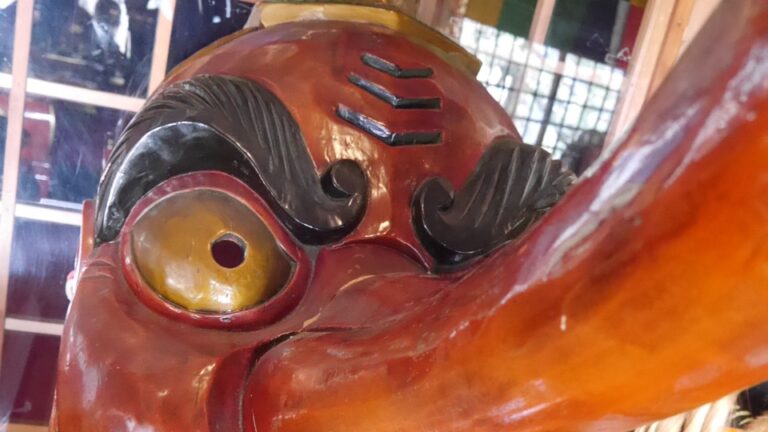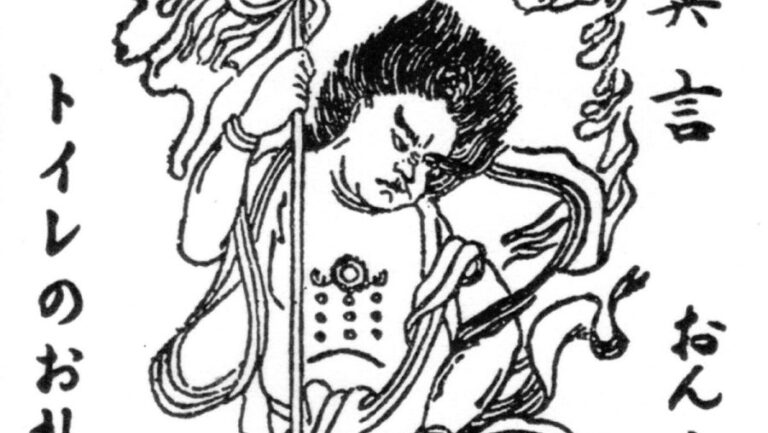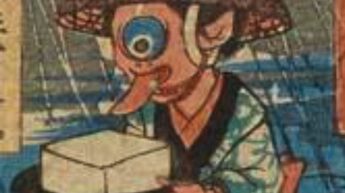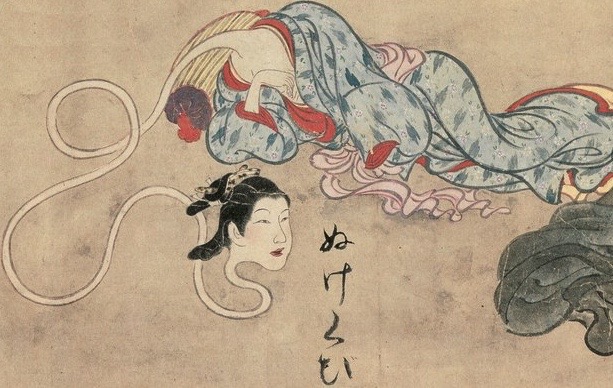Shhh, listen. Do you hear that? Does it sound like a bug? Is it trying to tell us something? I think maybe it is.
Intro
I’m author Thersa Matsuura and you’re listening to Uncanny Japan, the podcast about yokai, folktales, and curious cultural quirks. Today’s episode is about mushi no shirase or bug news! It’ll start pretty bizarre and then end with a chilling ghost story.
What is a Mushi no Shirase (虫の知らせ)?
So what is a mushi no shirase anyway? The literal meaning is: message or notice from an insect. But what does that mean? Well, if you ever hear anyone saying the phrase: I got some news from a bug, know that they’re talking about a premonition, foreboding, or that strange feeling something bad is going to happen. It’s a kind of sixth sense. It can also be a prophetic dream or some curious occurrence that warns you as well. Let’s unpack.
Some definitions in English say it’s the same as “a little bird told me”. But I don’t think so. It sounds the same at first glance, learning some bit of information from a cute little animal. But when I thought about it, I’ve always used a little bird told me in a light almost teasing way.
“Hey, are you going to open a ninjutsu school downtown? Yes, how did you know? A little bird told me.” It’s used when you don’t want to reveal the source of the gossip. But the source is a real human, not something otherworldly. Different.
On one hand, a little bug gave me some news is more intuition and a bad one at that. Every incidence I can find of mushi no shirase an every person I’ve asked, says it is something negative. Either a thing that has already happened, — like, having the overwhelming urge you should call your aunt Beatrice, only to find out later she just passed away that morning — or a dream about fire that bothers you so much, you wake and go check the space heater downstairs, only to find you left it on, it’s dangerously close to the curtains, which have already started to smoke. So there are times when you get a mushi no shirase that you can ward off that bad event.
Why a Bug?
But let’s back up a minute. Why a bug?
Well, one theory is it comes all the way from Doaism. The belief in sanshi (三尸) or sanchu (三蟲), or that we all have three bugs living inside us. This might sound familiar if you listened to episode 3, way back in the day.
A brief recap: Back in the Heian Era (794-1185). The aristocracy had this wild belief that human beings had insects living inside our bodies. One in our heads, one in our gut, and one in our … Legs. You heard that right. Or an older text says, they’re demonic parasitic creatures and they live in our head, chest, and abdomen. Sometimes they’re called three corpses. But if you want to be more precise, the word most like meant ‘corpse bringers’ because their job is pretty much to shuffle you off as quickly as possible. Whatever they are, they’re up to no good. I’ll call them bugs. The kanji for chū in sanchū (三蟲)is a character consisting of the kanji for bug (mushi), get this: written three times(蟲)
How do the Bugs Shorten Your Life?
What do these bugs do and how do they try to shorten your life or make you very ill? Well, first they spy on you, of course. Since they live inside you, they’re watching everything you do, all day and night long. And their taking notes. Then every sixty days when a special day called koshin rolls around, they wait until you fall asleep and zoom up to heaven. Here they rat on you to tentei or enma daio. The king of hell. And yes isn’t it neat the king of hell is hanging out in heaven. Kind of like when Lucifer used to hang out with god in heaven until god kicked him out.
Since this is originally a Chinese tradition that came to Japan, you’ll find the deity in China referred to as the Director of Destinies, which sounds about right. Whatever his name, though, these three bugs tell him everything you’ve been up to, especially the bad stuff. They’re little tattle tells and trying to get you in trouble. Tentei or Enma Daio or the Director of Destinies then nod their heads and start taking days off your life or giving you some disease.
A little aside, yes, the Daoists did go to great lengths to rid themselves of these parasites. It was quite strenuous.
Back on track. Because this was so worrying to those Heian Era folk, they came up with the idea that if they stayed up all night long on one of these koshin days, then the sanshi couldn’t leave their bodies and report on them. Take that bugs!
This sanshi belief stayed popular and even spread to the lower classes all through the Edo Period, only losing favor after the Meiji Government decided to separate Shinto and Buddhism in 1872. Then the koshin faith was deemeda superstition and quashed.
Bug News Related to the Sanshi Tradition?
Because of that very long history, some think the “mushi no shirase”, bug news idiom, since it’s usually used to refer to something bad, was born from this idea of sanshi – three insects.
There’s another theory though. That one says the phrase comes from the Edo Era. By then the belief had spread down to the lower classes and gone through some changes and in some of these, it was thought not three but nine bugs that lived in our bodies. And these critters weren’t there just to monitor and report your misdoings but to control your consciousness and emotions.
Messages from an Insect are Ghosts?
So that is one theory about the phrase insects news. But here’s another. This comes from a book I have on Japanese ghosts and to me it’s actually more chilling that the belief I’ve got three parasitic bugs who want me dead living in my body.
First, it goes more into detail about how many different things count as mushi no shirase and goes quite beyond a foreboding feeling. It describes sounds that act to warn us, things like how people have reported the bells on their butsudan (family altars) ringing even though no one was in the room. Or people hearing someone walking down the hall outside their bedrooms, but no one else is home. Or some hearing the front door slide open, but when hurrying over to see who it was, no one is there.
Could be a Smell
The phenomenon can also appear in as an olfactory caution. Here people have smelled incense burning in their house when they weren’t and hadn’t been burning incense. Little personal note here. In the house I’m renting now for about five years, I’ve always been a little freaked out that sometimes I’ll walk into a room and it’ll reek like cigarette smoke. No one in the house. No windows open. I don’t smoke. I always chalked it up to the old man who used to live here being a smoker and perhaps his spirit decided to come back and hang out for a couple hours. I never thought he might be trying to TELL me something.
Oh, another malodorous way a mushi no shirase might be trying to get your attention is when you suddenly get a nose-full of the stench of rotting corpse.
Then there are those weird occurrences that happen. Sure that photo of uncle Dan might be askew because someone bumped it, or he might be trying to tell you something. There was an incident in 1970 about a poor junior high school-aged kid who was diagnosed with leukaemia. In the hospital he ended up passing away, but at the exact time he died (11:15) the clock in his homeroom stopped running.
Real Story Published in Newspaper
Okay, as I promised, I’ll leave you with a ghost story that involves an instance of mushi no shirase.
This was published in the Asahi Newspaper in Showa 32 (1957). The report goes that in Tokyo, Minami Sunamachi there lived a young man who went to the police to report that his mother was missing and dead. Please find her. The police thought this was a strange request. How do you know she’s dead? Well, she’s been missing since the end of January, but last night she came to me and stood beside my futon. She told me she was in a place called “shinden”. Oh, yeah, and what was really weird was that her hair was all standing straight up.
The police chief thought this was ridiculous, but the young man was so insistent he pulled out the unsolved incident reports involving strange deaths and went through them one at the time. When he was almost at the end he came across one photo that showed an old woman on her side, her hair straight up over her head. He showed it to the distraught man, and yes! That was he dear mother.
The address where she had been found had “shinden” in it. As for the hair, the poor old woman had been found floating in the river. I looked up the address in the article and I’m guessing it was the Edo River. Anyway, it was discovered later but one of the members of the maritime rescue team that found her body and laid her out for the photo took the time to neatly comb her hair so that it was standing straight up.
The end.
Is it just me or is the most disturbing part of that story that the member of the rescue team had a comb on hand and combed her hair so it was all going straight up? Combing her hair, I’ll give them that, as this will be a photo to be used to help her loved ones identify her. But why that way?
Okay, that’s all for today my friends. I want to thank my son Julyan for the new intro music and thank Richard for all the audio and website work, thank my patrons for being the most wonderful people in the world, and thank you for listening. Everyone stay safe and well. Keep your eyes, ears, and nose peeled for any mushi no shirase, and I’ll talk to you in two weeks.
Bye bye.
Mushi no Shirase FAQ
What does the term “mushi no shirase” mean?
“Mushi no shirase” literally means “message or notice from an insect.” It refers to a premonition or foreboding feeling that something bad is going to happen. This can manifest as a prophetic dream or a strange occurrence that serves as a warning.
How is “mushi no shirase” different from the English phrase “a little bird told me”?
While both phrases involve receiving information from an animal, “a little bird told me” is used in a lighthearted or teasing manner to imply gossip. In contrast, “mushi no shirase” is more about intuition and is associated with negative or foreboding messages.
What is the historical or cultural origin of “mushi no shirase”?
One theory traces it back to Taoism and the belief in “sanshi” or “three bugs” that live inside the body and report on one’s actions to deities. Another theory suggests it comes from Edo-era beliefs where multiple bugs in the body influenced emotions and consciousness.
What other forms can “mushi no shirase” take apart from feelings of foreboding?
Besides feelings, it can include auditory warnings like bells ringing, olfactory warnings like the smell of incense or cigarette smoke, and other strange occurrences such as photos being askew or clocks stopping at the time of someone’s death.
How can listeners support “Uncanny Japan”?
Listeners can support the podcast by subscribing, reviewing, and sharing it with others. They can also join the Patreon for additional content for five dollars a month or purchase the host’s horror short story collection, “The Carp-Faced Boy and Other Tales.”






